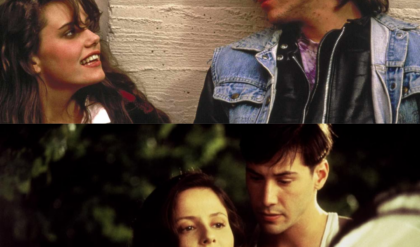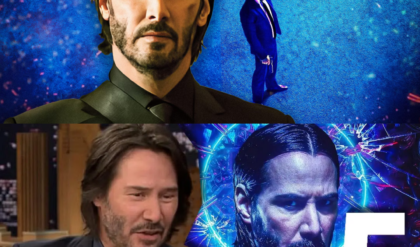Time has been kind to this pacey mash-up of Groundhog Day and action movie, in which a reluctant soldier fights aliens and dies in a seemingly endless time loop
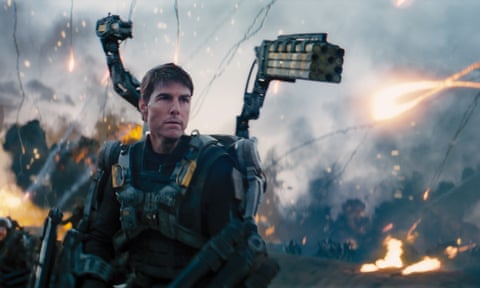
Cruise plays an army PR officer press-ganged into service to fight aliens, who finds himself stuck in a time loop. Photograph: Courtesy of Warner Bros. Entertainment/Publicity image from film company
Edge of Tomorrow at 10: Tom Cruise’s sci-fi spectacle gets better every time
Time has been kind to this pacey mash-up of Groundhog Day and action movie, in which a reluctant soldier fights aliens and dies in a seemingly endless time loop
Edge of Tomorrow was a box office flop when it arrived in cinemas in 2014, but time has been kind to it, the film eking out a loyal fanbase and now considered by many a modern classic. Justly so, because hot damn it’s one helluva ride: a rootin’-tootin’ sci-fi spectacle starring Tom Cruise as a reluctant super soldier caught in a Groundhogian time loop, fated to repeat the same day ad infinitum no matter how many times, or how gruesomely, he perishes on the battlefield.
It’s perhaps not the kind of production typically associated with deep subtextual meaning, though there’s plenty under the bonnet for those wanting to take a look: one can read it, for instance, as a comment on the infallibility of the Hollywood hero, forever destined to die another day. Or a rejuvenation and gamification of the ancient idea of reincarnation, the protagonist reaching a state of enlightenment via a video game-like pattern of living, dying and levelling up.
In one sense Cruise’s protagonist, William Cage, cannot be killed, given the aforementioned time loop; in another he cannot help but die, thrust into a gruesome cycle in which he gradually learns how to take down the enemy. On that front he is assisted by superstar soldier Rita Vrataski (Emily Blunt, in an ass-kicking performance that gives Cruise a run for his money) who was once caught in the same brutal pattern.
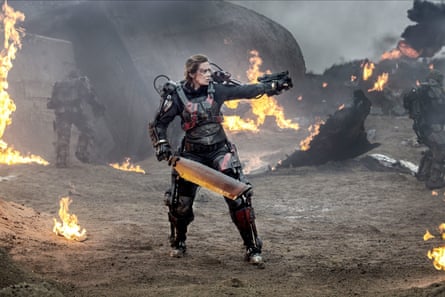
Director Doug Liman (adapting Hiroshi Sakurazaka’s illustrated novel All You Need Is Kill) gets us up to speed with the woebegone state of the world via a frenetic opening news montage. Europe is the centre of a war in which humans have not been able to defeat the alien invaders, called “Mimics”, or even able to put up a decent fight. General Brigham (Brendan Gleeson) wants to send Cage, a public affairs officer with no combat experience, to cover the war from the frontline as part of an effort to sell an upcoming invasion to the public. The smug Cage (nobody can do smugness like Cruise!) jokes around then attempts to blackmail Brigham into changing his mind.
The smile is wiped off Cage’s face when the general deploys him to the frontline and he discovers himself fighting the same fight over and over, the stink and fury of war making Bill Murray’s experience of a snowed-in small town in Hollywood’s greatest time loop movie seem comparatively like heaven.
Edge of Tomorrow is oomphy and pressure-packed from the get-go but really starts smoking when Cruise and Blunt begin sharing scenes. Cage recruits Vrataski as his mentor; she’s the only person, other than army scientist Dr Carter (Noah Taylor), who will listen to him without calling for a straitjacket. Cruise and Blunt have great, flinty chemistry – exchanging lots of steely looks – and it’s refreshing that Liman doesn’t sandwich their characters together romantically.

The influence and brilliance of Groundhog Day made certain moments inevitable, such as scenes in which Cage convinces people of his time-looped self by sharing details nobody could know, or by anticipating their every move and conversational pivot. These moments are satisfying because the audience shares a special fellowship with the protagonist, allowed to cross the temporal line and follow things from his perspective.
Co-writers Christopher McQuarrie (who would go on to direct Cruise in the Mission: Impossible franchise and Top Gun: Maverick), Jez Butterworth and John-Henry Butterworth toy with ideas around fatalism, Cage discovering at one point that he can seemingly do nothing to prevent the death of a key character. But you can tell their hearts aren’t in it: this is a Hollywood movie after all, and the world’s problems are very much solvable, with the hero story arced to save humankind by using good ol’ repetition as a learning tool.
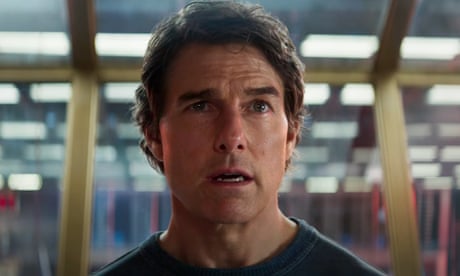
Final reckoning? Trailer for Mission: Impossible 8 suggests end to franchise
The idea of life as a series of narrative patterns lends itself perfectly to montages, which are staged by Liman with an electrical energy; the pace of this film really sings. There are highly immersive depictions of futuristic battle grounds, the humans equipped with mecha-like super suits and the aliens given tentacle-like black bodies that brought to my mind Medusa’s hair. But Liman never lingers for too long or makes the mistake of thinking the theatre of war is the biggest attraction.
What could have felt like a single, over-milked concept is padded out spectacularly well. Every once in a while a news story emerges about a potential sequel, but I like the idea of keeping the film as is and returning to it, again and again, in a self-imposed time loop of action movie greatness.
